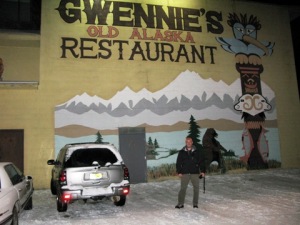Skidaway Institute professor Marc Frischer is back in Barrow, Alaska, along with grad student Zac Tait, to conduct field work on his project into the effects of warming climate on the marine food web in the Arctic Ocean.
As he did with a prior trip last summer, Dr. Frischer will send updates on his “adventure.” To review his earlier trip, the first of his series of posts can be found here.
Hi all, we’re heading back to Alaska to complete another sampling expedition of the high Arctic. If you recall, our last trip was during the summer time when temperatures were mostly above freezing and the ocean was liquid (if you missed our previous trip you can catch up from our previous blogs). Things are a little different up there now. Read on!
We began planning for this trip almost as soon as we got back from the last. The minute details, especially getting necessary chemicals and other supplies in place require an amazing amount of organization. But we mostly managed (thanks largely to Victoria Baylor’s hard work). The goal is to never get ahead of your equipment and supplies.
With our gear shipped off, the day for our departure finally arrived. This time Zachary Tait and myself are making the trip. Zac is a graduate student from Savannah State University who has been making this project the focus of his MS thesis research. Unfortunately, both Zac and myself are still getting over bad colds so we didn’t feel quite 100%, but we persevered.
Leaving Savannah in the early morning we flew first to Atlanta (as usual), on to Minneapolis, and then to Anchorage. We arrived in Anchorage at 6:00 pm local time (10:00 pm Savannah time) for a total of 14 hours of travel. Weary, we checked into our hotel in Anchorage and headed out for a quick bite to eat at a nearby local restaurant; “Gwennie’s”.
It was surprisingly good. Both of us ordered the chicken fried steak and a locally brewed beer which Zac felt obligated to share with the restaurant’s mascot Brown Bear.
After a satisfying dinner, neither of us had a hard time sleeping and we got as much of it as we could before having to wake at 3:30 am to catch our next flight. Leaving Anchorage we flew first to Fairbanks, on to Prudhoe Bay, and finally into Barrow.
In Barrow we were immediately shocked by the weather, stepping off the plane it was -42°F with a windchill of -67°F. Even the natives think this is cold.
Once we collected our bags (everything made it) we hopped in the truck and headed to the Northern Arctic Research Laboratory (NARL) campus. Since our last trip our logistical support team switched to a different group. Many of the people and procedures are the same, but there are several new faces (to us) and some of the facilities are different. We’re optimistic that this will work out well (So far it has.). Once we had a briefing and were introduced to the new folks, we quickly got to work rounding up all our gear and setting up.
We made a lot of progress but we didn’t get it finished. For one, the temperature controlled environmental chamber that we will work in to filter all the water we collect wasn’t ready for us. Apparently it had been used since our last visit to process whale meat. We didn’t actually look at it, but we were told that they had to remove the floor (too much blood soaked into it), grind the scum off the walls, and finally sterilize the whole room with bleach. Glad I didn’t have to do that job! Hopefully, the room will still be suitable for our use and it will be available tomorrow.
But back to the day. Today, it turns out, was the first sunrise in Barrow since November.
The sun rose at 12:38 local time and set at 2:46pm. But it wasn’t at all dark for much of the surrounding hours because of the twilight time. I was surprised at how bright the extended twilight period was. Today twilight extended from 10:27 am to 4:54 pm. This actually gives us quite a lot of light to work in. But today was the first time the sun rose above the horizon. Cool huh? I had thought the locals would have celebrated at bit, but apparently not. I asked Tony Kaleak, a native about it and he told me, sometimes, if they notice, they look at the sun for a moment and say “Right On”. Anyway, we thought it was pretty spectacular.
By 5 pm we were pretty beat and decided to call it a day, spending the rest of the evening discussing details with the logistics staff and picking up a new member of our team, Lollie Garay from the airport. Lollie is a science teacher being sponsored by the Polar Trek program to accompany us and develop collaborative relationships with local educators. Its pretty exciting stuff. Lollie is also going to blog about her experience and as soon as I get her blog address I’ll pass it on.
But now its time for me to get a little shut eye. Tomorrow will be another busy day preparing.
marc







Hey Zack, glad you made it up there, only envy you your adventure a little bit… btw, ref. our last discussion about Ocracoke, they have a reverse osmosis water treatment system. Would that not impact your assesment? Stay warm! J.